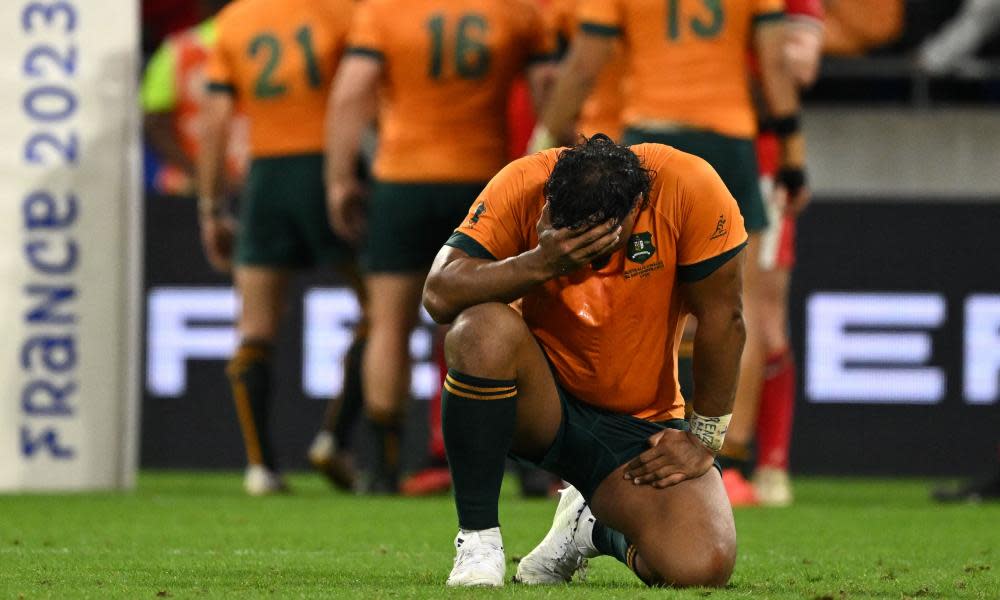
There’s something rotten about the state of Australian rugby union. A 40-6 Rugby World Cup defeat to Wales confirmed what most down under already knew – the 15-man code and the men’s national team is in one hell of a hole.
Fresh from a historic loss to Fiji last week, the men in green and gold backed up with an even more embarrassing capitulation in Lyon. The Wallabies have one last run out against Portugal, next weekend, but that should be a mere formality.
Related: Wallabies face humiliating Rugby World Cup exit after shambolic defeat to Wales | Dan Gallan
Barring a major miracle they will be not advance past the group stage and head home from the tournament in France early for the first time ever. For the two-time William Webb Ellis trophy winners, and the nation that produced David Campese, Tim Horan, George Gregan, Joe Roff and John Eales, it doesn’t get much worse.
What makes it even sadder – and entirely predictable – is that the writing has been on the wall for years, if not at least a decade. Grassroots rugby in Australia is struggling, participation is in decline and the women’s game is up in arms. The NRL and AFL are thriving across the country as they grab fans, the best young athletes, media space and broadcasting dollars, while Super Rugby has been on the wane for an age.
In a land where the fight between the football codes is intense, where cricket reigns supreme in the summer and even basketball has a steady foothold, rugby union has fallen well behind. While the provincial game and the administration have been called into question and come under fire for some time, the Wallabies – the main symbol of the sport in Australia – have consistently underperformed.
As the lure for players to ply their trade in France, the UK and Japan has increased, due to the rich treasures on offer, the quality of Australia’s Super Rugby footprint has suffered. When you are not playing against the best week-in-week-out for your state or province, you are hardly going to be fully prepared to face Antoine Dupont or Jonny Sexton on the international stage. Allied to that has been the flood of Australian talent to other countries, emphatically emphasised by Canberra-born and raised winger Mack Hansen scoring Ireland’s only try against South Africa on Saturday.
Related: Eddie Jones ‘committed’ to Australia after reports of Japan interview
The Wallabies have lost 18 of their past 24 games and won just once (against Georgia) in their eight matches under coach Eddie Jones. They haven’t won the Bledisloe Cup for more than 20 years and haven’t claimed a Rugby Championship title since 2015. Australia are far off the pace compared with the Springboks, All Blacks, France and Ireland, not to mention Wales, England and others.
The hard but inescapable truth is that the Wallabies have been poor for years and this World Cup was no surprise. Even since the Michael Cheika-Raelene Castle disaster in Japan four years ago, the rot has been brutally exposed. Kiwi coach Dave Rennie held the reins for a while, and somewhat steadied the ship. But he couldn’t navigate the iceberg ahead and he was ruthlessly sacked and replaced by Jones just six months ago.
Rugby Australia bosses thought the axing of Jones by England in January was a godsend. A gift enabling them to turn Australian rugby around – it wasn’t. What they thought was a masterstroke has quickly turned into another major blunder.
Officials thought Jones, with his quick wit and ocker personality, would galvanise interest and get the media on board. They thought, with a British and Irish Lions tour to Australia in 2025, not to mention hosting the World Cup on its own shores in 2027, he could spark a golden decade.
And while the wily 63-year-old did grab some column inches early with his one-liners and his poaching of Joseph Sua’ali’i from the NRL, he has failed where it matters most – on the field with his team.
There was little time for Jones to implement changes or try new players with only a handful of games before the World Cup. The coach decided to gamble massively by leaving captain Michael Hooper at home, along with veteran playmakers Quade Cooper and Bernard Foley. Instead, he took just one recognised No 10, Carter Gordon, as part of a young squad to try to build for the future. It’s a strategy that has been badly exposed in France.
Related: Australia mirror Eddie Jones by looking lost and heading for early exit | Gerard Meagher
Jones disrespected opponents and the World Cup itself by focusing purely on 2027, and not the tournament at hand. His recent contact with Japan about a potential future job, as reported by the Sydney Morning Herald on the eve of the Wales game, was an even bigger slap in the face to fans. As Foley tweeted during the Welsh loss: “It didn’t have to be like this!”
The 76-cap Wallaby is right. Rugby Australia does not need a magician to turn around the fate of the sport and its national team, it needs real reform to its provincial system, a national model similar to that employed by Ireland and improvement to its pathways. It needs changes to its selection policies, a bigger focus on its amateur ranks and an end to the blazer brigade and old boys network that dominates its power structures.
“There’s been a long period of mediocrity and it needs to change,” World Cup winner Gregan admitted after the Wales fiasco. There’s no time like the present.
Article courtesy of
Source link